#chile violates human rights
Photo
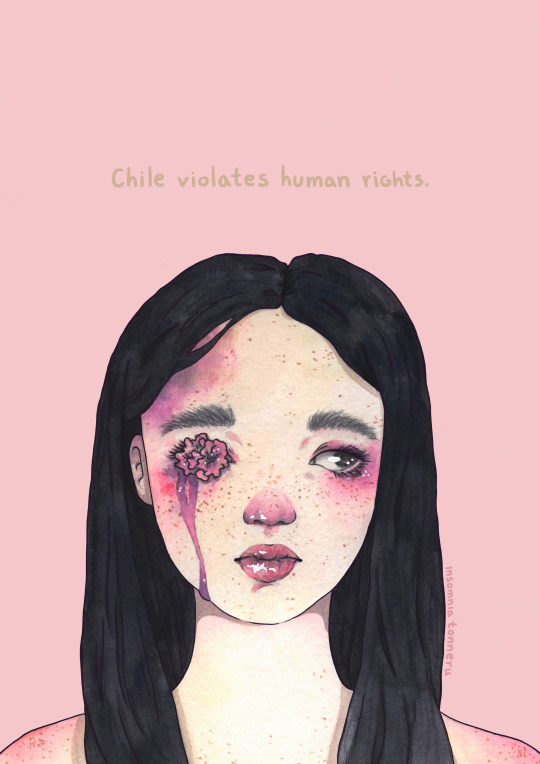
I don't like this illustration so much anymore, but I painted it when, in Chile, hundreds lost their eyes, mutilated by the police for protesting in the streets. Since october (and before) many have died, been tortured, raped and imprisoned. Some of them are still imprisoned, without evidence and without trial. Women and girls were stripped naked in police stations and a 16 year old boy was thrown into the river from a bridge by police. A 22 year old boy was shot in the face, leaving him blind, by a policeman who received no punishment. At the time, he was a psychology student, as was I that same year.
Coming close to changing our constitution cost lives and eyes. I hope we remember it in september.
ACAB
♥✧
Ya no me gusta tanto esta ilustración, pero la pinté cuando, en Chile, cientos perdían sus ojos, mutilados por la policía por protestar en las calles. Desde octubre (y desde antes) muchos han muerto, sido torturados, violados y encarcelados. Algunos de ellos siguen presos, sin pruebas y sin juicio. Mujeres y niñas fueron desnudadas en las comisarías y un chico de 16 años fue arrojado al río desde un puente por la policía. Un chico de 22 recibió un disparo en el rostro que lo dejó ciego, por un policía que no recibió castigo. En ese momento, él era un estudiante de psicología, como yo ese mismo año.
Acercarnos a cambiar nuestra constitución costó vidas y ojos. Espero que lo recordemos en septiembre.
ACAB
♥✧
#illustration#girl illustration#chile#chile violates human rights#human rights#ddhh#18 octubre#revuelta#art#watercolor#traditional art#draw#drawing#original work#artists on tumblr#artist#women artists#ilustracion#arte#arte tradicional#acuarela#acab#1312
3 notes
·
View notes
Text
UPDATED LINKS PART 2
IRAQ
The Iraq protests explained in 100 and 500 words - BBC News
Iraq Protests - Latest news, videos and opinion | Middle East Eye
Petition · Stop The Violation Of The Human Rights In Iraq. · Change.org
Petition · Democracy and Accountability in Iraq · Change.org
Petition · Exposing and Sanctioning Human Rights Violations by Iraqi and Iranian-backed Militias · Change.org
Petition · Protect protesters rights and lives in Iraq · Change.org
CHILE
chilewokeup
ZIMBABWE
#FreeZimbabwe (google.com)
Zimbabwe (genocidewatch.com)
TIBET
Link in bio for petitions ⬁ The people of Tibet have been trying to get their voices heard for so long. Let’s help them by raising our… | Instagram
important)
MALAYSIA
Petition · JUSTICE FOR MUGILARASU · Change.org
Petition · Revoke Islamic Police license to arrest members of the Transgender community · Change.org
SINGAPORE
Lepak Conversations (@lepakconversations) • Instagram photos and videos
Singaporean Issues (sgmatters.carrd.com
Puerto Rico
Gree ✧ 🇵🇷🎱 on X: "A brief thread in the history of Puerto Rico -🧵🪡 To celebrate Hispanic heritage month, I decided to make two threads: One for PR history and another for culture. I'm going to start with history because it is very important to give context to current PR! https://t.co/lt6QG4vrkq" / X (twitter.com)
CUBA
What is happening in Cuba and why are protests happening now? | The Independent
VENEZUELA
Venezuela crisis: Facts, FAQs, and how to help | World Vision
Homepage - Stop AAPI Hate
Top Conflicts to Watch in 2021: Economic, Political, and Humanitarian Catastrophe in Venezuela | Council on Foreign Relations (cfr.org)
Venezuelan Humanitarian and Refugee Crisis - CDP (disasterphilanthropy.org)
SRI LANKA
Human rights in Sri Lanka Amnesty International
Still No Justice on Sri Lanka War Anniversary | Human Rights Watch (hrw.org)
#free tibet#malaysia#singapore#chile#iraq#human rights#human rights violations#social justice#middle east#united nations#sri lanka#cuba#venezuela
103 notes
·
View notes
Text
1 note
·
View note
Text
quick reminder that 9/11 isn’t only an important date in us history, but also in chilean history as well.
today marks the start of a military dictatorship that ruled chile for 17 years (1973-1990) due to the political intervention of the united states. this period was characterized by blatant human rights violations, with people getting exiled from their own country because of their political beliefs and chileans (of all ages) getting tortured under this military regime.
according to the informe rettig (a comission that investigated the human rights violations during the dictatorship), there is an estimate of 28,259 victims of political prison and torture, 2,298 executed and 1,209 detenidos desaparecidos (people that “went missing” while they were detained by military authorities). these people ranged from figures of political opposition, their relatives, students, indigenous people, immigrants, underage kids, among many others.
despite the fact that the dictatorship of augusto pinochet was over fifty years ago, there are still chilean citizens that do not know what happened to their loved ones that went missing during this time period.
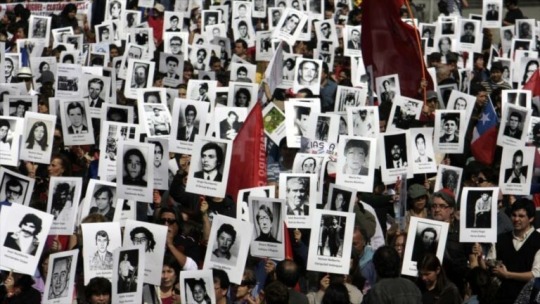

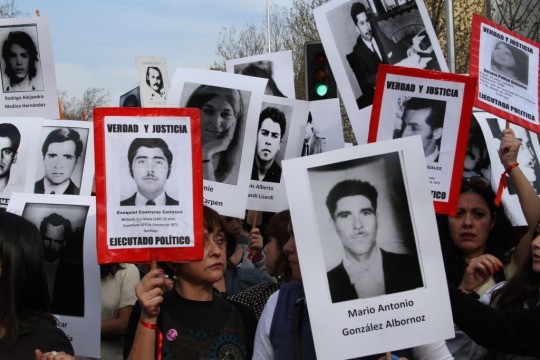
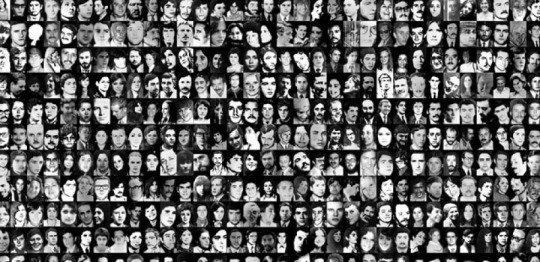
fuerza a todos los familiares y amigos de los detenidos desaparecidos. merecen justicia.
ni perdón ni olvido.
2K notes
·
View notes
Text
Fosen update 12th of October 2023
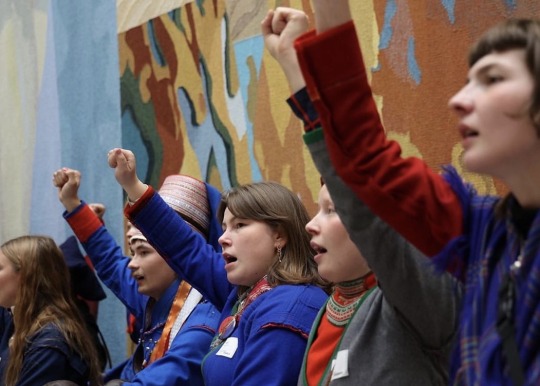
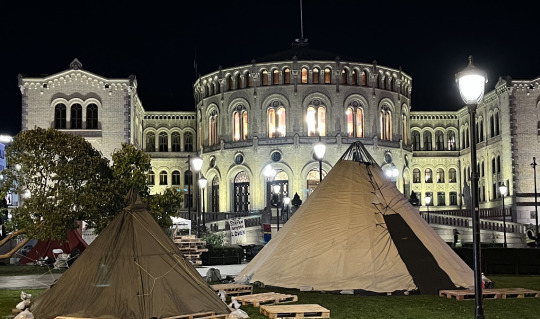
Yesterday was the 11th of october, which means it’s been two years since the supreme court ruled the wind power plants at Fosen illegal and a violation of indigenous human rights. The local sámi reindeer herder families sued the state and WON in the supreme court, and despite this, the wind turbines are still up and the government is making no effort to change the situation even though they apologized and called it an ongoing human rights violation back in march after the first round of demonstrations. We live in a country where the state and state owned power companies can continue to violate sámi rights even after losing in the supreme court. 11th of october also exactly one month after the 700th day since the ruling, which was election day, and the day a sámi activist and artist moved into a lávvu in front of parliament where he still lives now. Because of threats, harassment, and vandalism, the lávvu has needed to be guarded 24/7 by other activists.
Yesterday, the main street in Oslo (which runs next to the parliament and continues up to the royal castle) was filled with lávvus while the surrounding traffic was blocked by people sitting down in the round. The lávvus were moved to the park in front of the parliament later that night, joining the first lávvu, pretty much filling up the whole lawn and some on the sidewalk. A group of activists entered the parliament, and yoiked (traditional form of singing/chanting) they sat in the main hall for hours until they were carried out by police while people were yelling ČSV and yoiking outside.
more than 40 years ago, sámi activists went on a hunger strike in a lávvu on that same grass to protest the building of the Alta hydroelectric power station (look up Alta conflict). They are still doing this to us, and they’ll continue unless we fight it and hold the state responsible for the harm it has done and continues to do to indigenous people of sápmi.
Today, all the entrances of the headquarters of the fully state owned company Statkraft have been blocked. Statkraft makes money off this ILLEGAL power plant. Statkraft operates the Alta hydroelectric power station, and the Pilmaiquén hydroelectric plant in Chile that the indigenous mapuche people have been fighting against. They have shown us so much solidarity and support in the fight against this company and Norway’s green colonialism, both in Sápmi and in Chile.

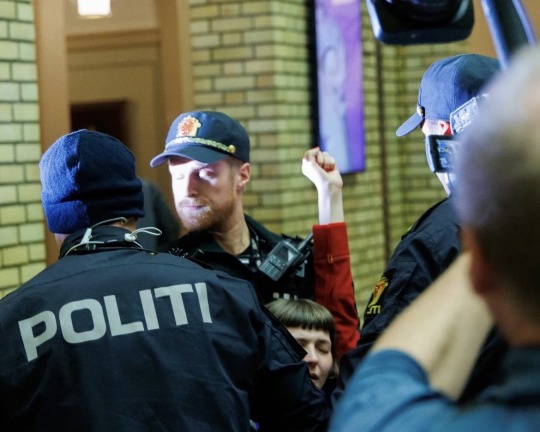
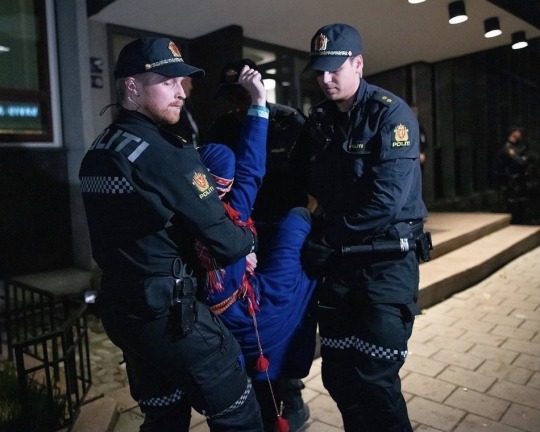
The lávvus in front of the parliament are still up, people are sleeping there and plan to stay.
thank you for listening to us, ollu giitu.
Baajh vaeride årrodh! ČSV ❤️💚💛💙✊🏼
317 notes
·
View notes
Text
Well here I am writing this in English, because I think it is something really important and should be talked about.
To put it in context I am from Chile, a country in Latin America, a country that during the years 1973 to 1990 suffered one of the most violent dictatorships in Latin America.
A dictatorship that at the beginning was imposed with the help of the CIA (look it up, I am not making it up), a dictatorship that was under the command of Augusto Pinochet, a dictatorship that violated the majority of Chileans only because of their political thinking, a dictatorship that killed and tortured thousands of men, women and children.
It is already known internationally that Chile in 2019 entered a process that we call "estallido social" where after the increase of 30 pesos of the subway fare in the capital the students and then the population rebelled against the government of that time, that of Sebastian Piñera. Thanks to this movement we realized as a society, that all these years after the return to democracy chile has been violated, politicians have laughed in our face, we realized that we need a change.
This is how the people of chile assumed and demanded a new constitution, because the current one was created by the dictator of chile, pinochet, a constitution that allowed and facilitated the violation of human rights in his time, a constitution that allows the abuse of a neoliberal system, a system that abuses the average chilean.
This is how for the first time in the history of my country a democratic constitutional process began (because all previous constitutions had been imposed), a constitution in which women participated in equal numbers, equal numbers of women and men in the constitutional process, a constitution in which the native peoples of our country participated, where everyone was heard and respected.
As some stupid people in the world (as well as in Chile) believe that asking for basic rights such as quality education, reproductive rights, quality health is to be immediately communist, a campaign of terror was made, the Chilean right implanted ideas such as for example that if the new constitution won they could take away your house, your health rights or that we would practically be the new communist Venezuela. Things that in the end were false.
Today was an important day for my country, today the country chose to reject this proposal, all based on false arguments, fear and uncertainty. The monetarily privileged sectors in my country (Chilean right) are celebrating, they went out to the streets to sing the anthem, because according to them they had gotten rid of an ultra feminist and communist constitution (which again is not true), it makes me angry more than sad.
We had as a country such a beautiful opportunity and we totally wasted it, we had the option to abolish a system created by a dictator 50 years ago and still because of the fear of change and the fear of uncertainty. All international specialists told us that this proposal was well done, a proposal that supported human rights, women's rights, the rights of indigenous peoples, the right to free and quality education, the right to quality health and many other things. We had the opportunity in our hands but here we are, we are back, we took a step to the past, we are still the same as Pinochet always wanted, we are still the same as 50 years ago.
If I have to summarize and define the constituent process (a process created by ordinary people who, unlike politicians, did not even know the reality of Chile). I read the project of the new constitution, it was very nice, it was almost perfect, of course it had some flaws in some articles but in spite of that in general the idea was good. There were articles that provided for the participation of women in all types of processes, there were articles that took care of the environment as no other constitution in the country had done, there were articles that supported all types of people regardless of their gender, the rights of LGBTQ people were guaranteed, a constitution made for a future Chile, a proposal that easily if approved could remain in force for a long time, it was a flexible constitution that accepted diversity and embraced it, it accepted that when the people change their political institutions as well. A constitution made for a future chile but unfortunately discarded by fear and lies. A constitution made for a future chile that was rejected by a people that condemns itself and lives in the past.
If you made it this far, thank you for reading, I really appreciate it, this is serious for me and I really wanted to share it. The whole world had its eyes on us and we wasted it.
The current president of chile, Gabriel Boric, said that he was not going to leave this path until here, that he was going to call for a new constituent process, and I hope so. I dream of a dignified Chile for the future generation, where my rights as a woman, the rights of the environment, the LGBTQIA+ rights , the rights of my native people, of Chileans will not be taken away, where we will be taken into account, where a constitution will do us justice,
I apologize for my bad English or if I used some words wrong, I am using a mix of translator and knowledge in English :)
Hoping that this message/news reaches various parts, it is very important for everyone here, we have returned to the past through fear and false terror imposed by the Chilean right, a political sector that has always had great privileges here and that has never wanted to release them and has not released them today.
If you can help me share this I would really appreciate it <3
#chile#chilean#latino#latina#latinoamerica#latam#news#international#augusto pinochet#dictatorship#usa#important#social rights#woman rights#native people#constitution#climate emergency#climate change#feminist#debate#estallidosocial#lgbtq#lgbtqiia+#lgbtq rights#politics#democracy
320 notes
·
View notes
Photo
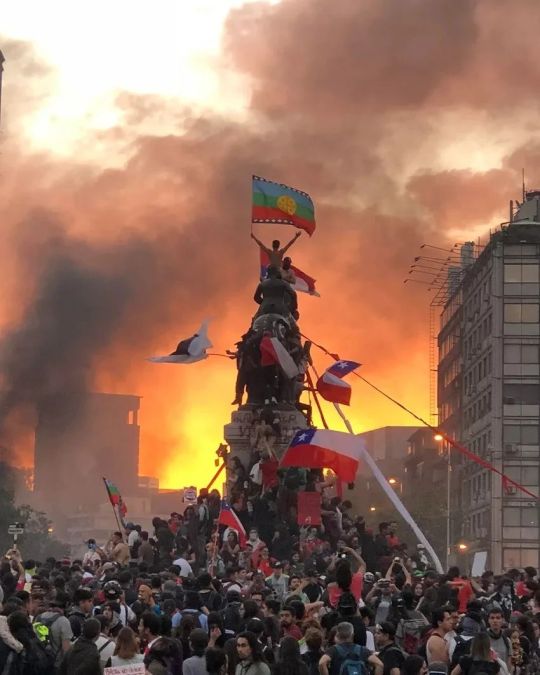
On this day, 18 October 2019, a series of large-scale protests known as Estallido Social (social outburst) began in Chile, one of the biggest uprisings in the country's history that lasted until March 2020. While citizen demands focused on social inequality and the ravages of decades of neoliberal policies, the unrest began in the wake of a fare hike on the Santiago Metro on 6 October, after which hundreds of high school students jumped the turnstiles at various stations, calling for fare evasion. After days of clashes between students and police, on 18 October, the right-wing government of Sebastián Piñera announced charges under the state security law, which carries harsh sentences. In response, thousands of people took to the streets, also demanding various improvements to living conditions and an end to abuses by the political and business class. Barricades were built, and acts of arson and looting took place. The next day, the protests spread to all regions of Chile. State repression was extremely violent and included torture, sexual violence, mutilations and extrajudicial executions, as reports on human rights violations issued by various international organisations found. The actions of the police resulted in 34 deaths, more than 8000 injuries and more than 400 cases of eye mutilation, including Gustavo Gatica and passer-by Fabiola Campillay, who both lost their eyes after direct attacks to the face. To date, only 0.1% of these complaints have resulted in convictions. After months of revolt, the demonstrations subsided following an agreement by politicians to organise a referendum on a new constitution, and the outbreak of the Covid-19 pandemic. In 2020, a plebiscite determined that the vast majority of the country wanted the abolition of the constitution from the dictatorship era. At the time of writing (October 2022), the formulation of a new constitution is still ongoing. https://www.facebook.com/workingclasshistory/photos/a.1819457841572691/2112887952229677/?type=3
208 notes
·
View notes
Text
vimeo
Sinister Operation
They, those who are in favor of honoring horror, of honoring the man who was at the head of the extermination, torture, disappearance and exile of thousands of our compatriots. Those who gathered a few days ago to honor and pay tribute to the dictatorial regime, headed by Augusto Pinochet, used freedom of expression as an argument to justify their apology for genocide.
Ironic that this was their main argument considering that freedom of ideas and expression was fought and suppressed without a hint of mercy for those they honor. However, thanks to the fact that we recovered democracy, even if it was protected and illegitimate, they can pay tribute to whoever they want. But just as they can do, we who are on the other side, on the side of the victims and the condemnation of Human Rights violations, had the right to express our repudiation of that tribute.
Appealing to that same right of freedom of expression, the Vinchuka Collective sought alternative means of protest and direct action. Our response to that search was to intervene in public space. The main objective of the intervention was to rescue memory, and stage an image that, despite being tremendously painful, is part of our history. From the history that this country should not forget.
We recreate the most sinister part of our history, that story that at times and for many of the victims becomes unspeakable. That story that Chile prefers not to look at. The story of victims and executioners. A woman tied to an electric grill surrounded by some of the most emblematic faces of Chilean repression. There were the figures of Pinochet, Krasnoff, Romo and Contreras. Those responsible for that horror, only some, many others are still anonymous or enjoy freedom. Also some civilians who are the ones behind all this and who have as much responsibility as those directly responsible for the massacre.
A woman's body is subjected to an attempt to annihilate and break her through pain, sexual abuse, and violence. She, in our recreation of the horror, screamed in despair, but even in desperation, there is resistance, that is why she also shouted some phrases, slogans and facts that are important that we not forget.
We believe that the intervention fulfilled its objective of rescuing the memory of those bodies and those identities. We also believe that it is important to expose that part of history to new generations so that it never happens again in Chile.
Anyway, some previous concerns were addressed to us, we knew that the image would be very disturbing and painful for many of those present at the funeral. The idea was not to reopen wounds. Nor disrespect the memory of the victims, much less aestheticize the horror. We just believe that it is important that Chileans not forget.
Finally, we would like to highlight that the image that we recreated generated various repercussions, it was enough to see the comments on social networks based on the performance, to realize that the reconciliation that they are trying to impose on us, that unity and agreements and all that, does not It is more than empty discursivity. Chile still bleeds from its open wounds that will not close as long as there is no justice.
MGL
Vinchuka Collective
7 notes
·
View notes
Text
i don't talk about it a lot here but i'm chilean and today marks 50 years since the chilean military coup that was backed and financed by the US
if you're from the US, while it's not your responsibility what your government and parents did decades ago, it is your responsibility to educate yourself about the atrocities your government caused and the consequences it had. i do not have the privilege to ignore what happened because it still affects my country to this day and had direct consequences on my family
all i want to ask from usamericans that follow me is too look up how Nixon and Kissinger contributed to Chile's military coup and the CIA's involvement, there are declassified records and documents just a google search away
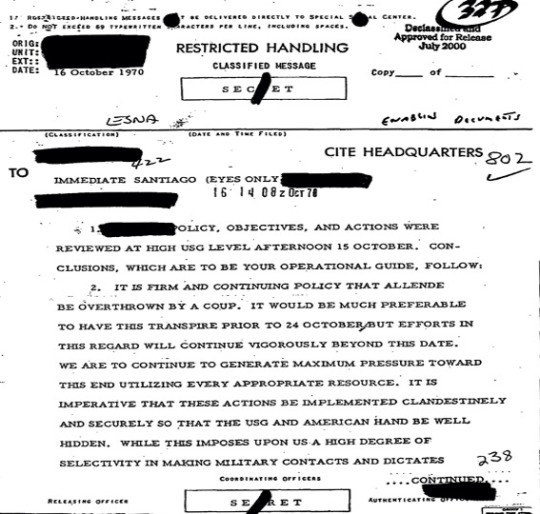
just to give you an idea of how horrible the dictatorship was: the number of direct victims of human rights violations in Chile accounts for around 30,000 people: 27,255 tortured and 2,279 executed. In addition, some 200,000 people suffered exile and an unknown number went through clandestine centers and illegal detention. Some 307 children under the age of 18 were killed during that period, according to human rights groups reviews of documentation from the National Truth and Reconciliation Commission.
educate yourself please, that's all i'm asking
17 notes
·
View notes
Text
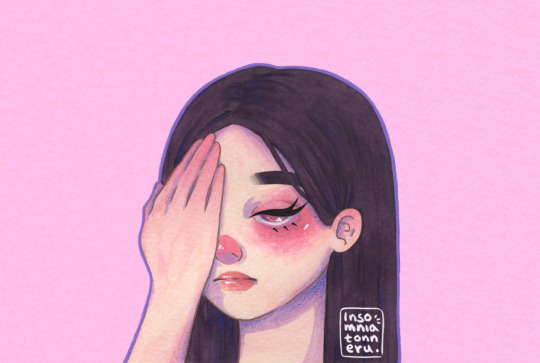
“¿Cómo puede haber gente dueña de tanto horizonte? ¿Cómo puede haber gente tan enguatada de paisaje? Me parece obscena esa glotonería de tanto tener” (Pedro Lemebel - Carta abierta a Sebastián Piñera).
Follow me on my other accounts ♡
#illustration#art#watercolor#apruebo#nueva constitución#chile#chile violates human rights#artist#draw#drawing#painting#watercolor painting#artists on tumblr#illustrators on tumblr#ddhh#ilustracion#arte#traditional art#acuarela#arte tradicional#oc art#original work
5 notes
·
View notes
Text
PERU: REFUGEES IN PERU FACE IMPOSSIBLE DEADLINE
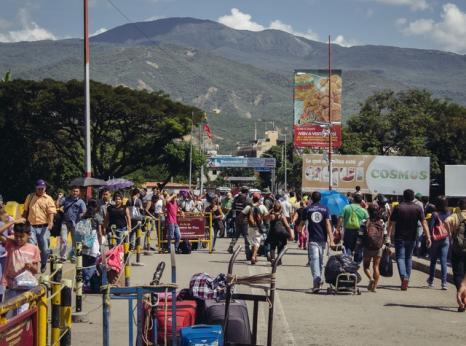
Venezuelan migrants crossing the border bridge
© Amnesty International/Sergio Ortiz
48 DAYS LEFT TO TAKE ACTION
As of 10 November 2023, Venezuelan nationals in Peru will no longer be able to apply for temporary protection. This status is essential for refugees to have a regular migratory status, access to basic rights, and protection against forced returns to Venezuela. Survivors of gender-based violence face heightened risks if excluded from this status. Venezuelan refugees should be granted temporary protection through programmes that are fully accessible, making such deadlines contrary to international protection obligations. We call on the Superintendent of Migrations to repeal this deadline, or at least extend it, to ensure all Venezuelans can apply for the permit.
By August 2023, over 25% of the population of Venezuela (more than 7.71 million Venezuelans) have fled massive human rights violations. That’s one in every four people in the country. Numbers are still rising: since May 2022, there has been a 1.4 million increase. More than 80% of these people are in Latin America and the Caribbean. Specifically, 70% are in Colombia (2.9 million), Peru (1.5 million), Ecuador (475,000), and Chile (444,000). Outside of Latin America and the Caribbean, the top 10 host countries include the United States, which ranks third, with 545,000 Venezuelan nationals in its territory (September 2021 figure). This figure is considered to be grossly outdated, with the population increasing daily as Venezuelans continue to be one of the top nationalities arriving to the US through the border and parole programs.
Amnesty International believes that Venezuelan nationals fleeing the country are in need of international protection and should be formally recognised as refugees, given the threat to their lives, their safety and their freedom as a result of massive human rights violations committed in Venezuela. Consequently, they cannot be returned to Venezuela or to places where their lives and human rights are at risk. However, a growing number of countries, including the US, have resumed deportation flights to Venezuela in contravention of international human rights and refugee law.
Take action now (Amnesty UK)
6 notes
·
View notes
Text
SANTIAGO, Chile (AP) — The world remembers Gen. Augusto Pinochet as the dictator whose regime tortured, killed and disappeared 3,065 people in the name of fighting communism.
But as Chile marks the 50th anniversary next Monday of the coup that brought Pinochet to power for almost 17 years, many in the country don’t see it as a dark day. Amid a weak economy and a surge in violent crime, recent polls show that many Chileans don’t think human rights are as much of a priority.
They are grappling with what they see as Pinochet’s complicated legacy at a time when a large number have told pollsters they are losing faith in democracy.
“Before, there wasn’t as much wickedness as there is now,” said Ana María Román Vera, 62, who sells lottery tickets. “You didn’t see as many robberies.”
A July poll by the Center for Public Studies, a Chile-based foundation, found that 66% of respondents agreed with the statement that rather than worry about the rights of individuals, the country needs a firm government. That is more than double the 32% who agreed with the statement fewer than four years ago.
In Chile, 9/11 was a landmark before the Sept. 11, 2001, terrorist attacks on the U.S. because it was the date of the 1973 coup in the South American country. That significance, though, has been changing. Polling shows more than one-third of Chileans today justify the military takeover of a democratically elected government that went on to violate human rights, murder opponents, cancel elections, restrict the media, suppress labor unions and disband political parties.
“There should be an overwhelming majority of Chileans who denounce the dictatorship and the military coup and acknowledge that the military destroyed democracy,” said Marta Lagos, director of the regional polling firm Latinobarómetro and founder of pollster Mori Chile. “That would be the normal situation in a normal country. But that’s not the case.”
Late last month, leftist President Gabriel Boric unveiled what will effectively be the first state-sponsored plan to try to locate the approximately 1,162 victims of the dictatorship who remain missing.
Yet even as Boric’s government and human rights organizations plan events to mark the coup anniversary, many in Chile don’t appear to see the ousting of a democratically elected leader as wrong.
A poll earlier this year by Lagos’ firm found that 36% of Chileans believe the military “freed” Chile “from Marxism” when it deposed leftist democratically elected president Salvador Allende, who came into power in 1970 and killed himself the day of the coup. The poll found that 42% said the coup destroyed democracy, the lowest number since 1995.
Pinochet led the coup at a time when the country was mired in an economic crisis that included scarcity of food and galloping inflation that reached an annual rate of 600%. When the military took over it implemented a free-market economy that suddenly meant those with means could go on a consumerism binge even as the poverty rate soared.
Retired accountant Sergio Gómez Martínez, 72, said that “fortunately, Augusto Pinochet led the coup” against Allende’s socialist government. He argued that his economic wellbeing improved under the right-wing military government “because there was order, employment, and the countryside and industries began to produce.”
Repression was unleashed on opponents on the day of the coup. On the days that followed, Congress was shut down and political parties were dissolved as the military junta snatched control of all aspects of society. Those opposed to the regime were regularly imprisoned and tortured and hundreds of thousands were forced into exile.
Gómez said the human rights violations of the Pinochet years “could have been avoided” but they do not seem to be at the centerpiece of his memory of the years of Pinochet’s rule, when by some estimates around 200,000 citizens went into exile for political reasons and some 28,000 opponents of the regime were imprisoned and tortured.
He’s hardly alone. Almost four in 10 Chileans think Pinochet’s 1973-1990 rule modernized the country and 20% see the dictator as one of the best rulers of 20th-century Chile, according to the Mori survey.
A regional survey by Latinobarómetro this year found that only 48% of Latin Americans think that democracy is preferable to any other form of government, which marks a 15-point drop from 2010.
Across Latin America, strongmen like El Salvador’s President Nayib Bukele are gaining popularity. Bukele has gained an ardent following due to his severe crackdown on gangs despite a record of human rights abuses.
Boric, meanwhile, has seen a sharp plunge in his approval ratings ever since he swept into power in March 2022 as Chile’s youngest-ever president at 36 following widespread student-led street protests that put on display how the economic inequalities borne from the dictatorship lived on. Citizens broadly rejected an effort last year to replace the country’s dictatorship-era constitution with what would have been one of the world’s most progressive magna cartas, and later went on to elect conservatives to write the next draft of the document.
Efrén Cortés Tapia, a 60-year-old painter, said his most vivid memories about the dictatorship years was not just the “repression” but also “not being able to listen to the music of forbidden folklore groups.” For him, the dictatorship led to “limits in the cultural development” as well as “fear and dread.”
Even as Chilean society grapples with its mixed feelings over the dictatorship, more is being learned about the repression of the years through the courts.
There are around 1,300 active criminal cases for human rights violations during the dictatorship and some 150 are serving sentences in Punta Peuco Prison, a facility exclusively set aside for those guilty of dictatorship-era crimes.
Boric’s administration is also looking abroad for answers, pushing the United States to declassify documents that can help shed light on the role Washington played in the coup it supported.
In late August, the CIA declassified portions of the President’s Daily Briefs related to Chile from Sept. 8, 1973 and Sept. 11, 1973 that confirm then-President Richard Nixon was briefed on the possibility of a coup.
During a recent visit to Chile, Rep. Alexandria Ocasio-Cortez, a Democrat from New York, said it was “very important … to acknowledge and reflect on the role of the United States” in the coup.
Pinochet remained in power until 1990, stepping down after a majority of Chileans voted against military rule in 1988. But he did not disappear and immediately became commander-in-chief of the Army until 1998 and later became a lifelong senator, a position he created for himself. He resigned in 2002 and died in 2006 without ever being convicted in Chilean courts, although he was detained for 17 months in London on the order of a Spanish judge.
“Chileans got used to living with Pinochet,” Lagos said. “Pinochet, I believe, is the only dictator in Western contemporary history, during this century and the last century, who, 50 years after his coup, is still appreciated by 30 or 40% of a country’s population.”
8 notes
·
View notes
Text
Since the Cold War’s conclusion, pro-democracy groups have emphasized the value of countries learning from the experiences of others. States like Argentina and Chile graduated from military to civilian rule in the 1980s and had much to teach Central Americans in the following decades. The Philippines got rid of Marcos in 1986 and later helped Indonesia, which moved on from its dictator, Suharto, in 1998.
Today, those who have been building democracy are seeing their techniques mimed by people who are out to destroy democracy. Repressive governments from across the globe are learning from one another. If this were a college for despots, we could imagine the course names:
How to Rig a Constitutional Referendum;
How to Intimidate the Media;
How to Destroy Political Rivals Through Phony Investigations and Fake News;
How to Create a Human Rights Commission That Will Cover Up Violations of Human Rights;
How to Co-Opt a Legislature; and How to Divide, Repress, and Demoralize Opponents So That No One Believes You Will Ever Be Defeated.
#book: facism a warning#facism#antidemocracy#argentina#chile#philippines#indonesia#1980s#20th century#1990s#tyranny#politics
1 note
·
View note
Text
Sola Sierra
Human rights activist Sola Sierra was born in 1935 in San Miguel, Chile. Sierra was active in the Agrupacion de Familiares de los Detenidos y Desaparecidos, working to uncover the whereabouts of the thousands of people who disappeared under Chile's military dictatorship. She also fought for Pinochet's extradition to Spain to stand trial for human rights violations. She was a key figure in Chile's human rights movement for over twenty years, and garnered an international recognition for her work.
Sola Sierra died in 1999 at the age of 63.
10 notes
·
View notes
Text
Lula rebuts comments from Boric and Lacalle
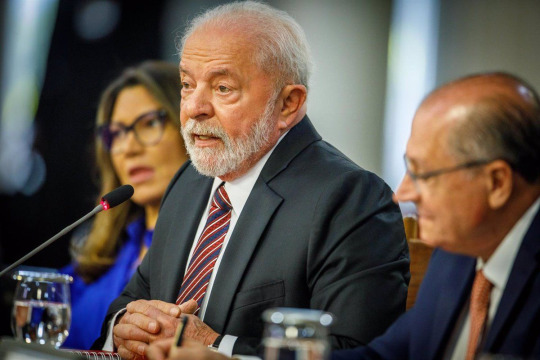
“No one needs to agree with anyone. This is how we do it”, said Lula in response to Lacalle's and Boric's criticism.
Brazilian President Luiz Inácio Lula da Silva stated on Tuesday that the meeting of 11 South American presidents at the Itamaraty Palace was not a group of friends, but of presidents seeking regional coordination, reported Agência Brasil.
Lula's words came in response to statements by Chile's Gabriel Boric Font and Uruguay's Luis Lacalle Pou on the fact that the Brazilian president has sweetened human rights violations and the weakening of democracy in Venezuela.
“The fact that there are two presidents who did not agree, I do not know in which newspaper they read it. I said that a meeting of Lula's friends was not convened here. A meeting of presidents was convened to build a body of countries,” Lula said.
During Monday's bilateral meeting between Lula and Venezuelan President Nicolás Maduro, the Brazilian leader said that the Caribbean country must disseminate its “narrative” on the political and economic situation to counteract the negative narratives made by opponents in the international scenario.
Continue reading.
#brazil#politics#chile#uruguay#venezuela#brazilian politics#luiz inacio lula da silva#foreign policy#democracy#mod nise da silveira#image description in alt
2 notes
·
View notes
Text
Most democracies are expanding abortion access. The U.S. is retracting it -
Fifty years ago, the United States was a global leader in recognizing women’s reproductive rights. Today, however, much of the rest of the world has caught up or surpassed the U.S. in extending abortion access.
The United States’ closest legal peers — Canada, the United Kingdom, New Zealand, and Australia — have laws that are either in line with or more generous than those here. Like the U.S., other liberal democracies including the Netherlands and Iceland, also protect the right to abortion until or near the point of viability. This is what makes the Supreme Court’s threatened reversal of Roe v. Wade not only dangerous and life-threatening, but legally indefensible.
The Texas law banning abortions at six weeks, before many women even know that they are pregnant, may be a sign of things to come. So far, the courts have allowed the law to go into effect even though it marks a dramatic regression in reproductive rights that both violates Roe and is far outside of international norms. The case is now before the Supreme Court once again, giving the court a second opportunity to uphold its own precedents and suspend these state-level restrictions.
A superficial review of abortion laws only ever tells part of the story of its actual availability. In many countries where the law on paper appears more restrictive than Roe, abortion is freely available in practice. In these countries, healthcare professionals apply the law in a way that respects the pregnant person’s view on how pregnancy would impact her health, life and existing family. This means that even where a national law lays down “grounds” for accessing abortion (like “risk to health” or “situation of distress”), women can almost always obtain the abortion care they need and want.
The anti-choice advocates also refuse to acknowledge the very clear, sustained and long-standing trend towards liberalization of abortion laws worldwide. In just the last five years in Europe, for example, enormous popular majorities chose to liberalize hyper-restrictive laws in Ireland, Gibraltar and San Marino. The laws in Northern Ireland (where abortion was completely decriminalized), Iceland, the Isle of Man and elsewhere were reformed to expand access.
A similar pattern emerges in the Americas where, apart from the United States, the clear and unequivocal trend is towards making abortion legal, accessible and safe. Mexico is only the most recent nation to liberalize its laws — following the same path as Argentina, Uruguay, Colombia and Chile. The U.S. is the outlier.
International human rights institutions, including United Nations bodies, have held that access to abortion is integral to the rights to life, health, privacy and non-discrimination. An amicus brief submitted by the UN mandate holders in Dobbs v. Jackson Women’s Health Organization, makes very clear that undoing Roe would be incompatible with established international legal standards.
There is no mystery to the worldwide trend toward liberalization. Abortion is part of healthcare, and women have abortions whether they are legal or not. When abortions are not legal, they are more likely to be unsafe — especially if people do not have the resources or information to access care from safe and reputable sources. (Not surprisingly, public health experts have found that maternal mortality drops in locations where women can safely access an abortion.)
con’t - https://www.wbur.org/cognoscenti/2021/10/21/supreme-court-abortion-dobbs-texas-martha-f-davis-fiona-de-londras
5 notes
·
View notes